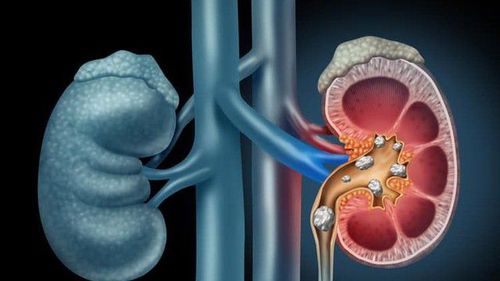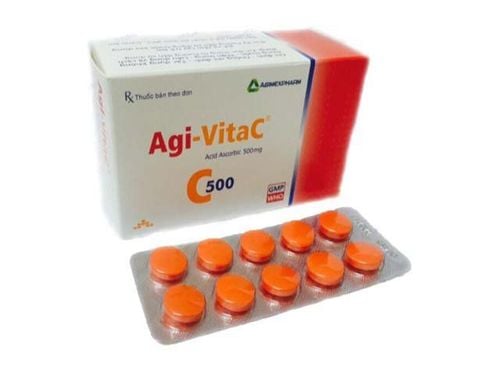This is an automatically translated article.
The article is professionally consulted by Master, Doctor Nguyen Thi Ngoc - General Internal Medicine - Endocrinology - Department of Examination & Internal Medicine - Vinmec Central Park International General Hospital. Doctor has more than 10 years of studying, researching and working in the field of endocrinology.Vitamin C has many important roles in the body. Too much or too little vitamin C can lead to unwanted effects.
1. The role of vitamin C in the body
Vitamin C has many important roles in the body such as:Participates in the creation of collagen and some components of connective tissue. Supports iron absorption because vitamin C participates in converting trivalent iron into divalent iron. Iron is easily absorbed by the body. Therefore, when iron deficiency anemia is often taken with vitamin C Participate in the body's metabolism such as metabolism of protid, lipid, glucid Participate in the synthesis of a number of substances such as catecholamines, adrenal cortex hormones, increase producing interferon, thereby helping to increase the body's resistance. Antioxidant by neutralizing free radicals generated by metabolic reactions in the body, thereby protecting the integrity of cell membranes; Helps increase calcium absorption into the body and increases bone density.
Trắc nghiệm dành riêng cho người mắc đái tháo đường: Chế độ ăn của bạn đã hợp lý chưa?
Người bị bệnh đái tháo đường cần phải quan tâm nhiều hơn đến cách tính toán khẩu phần ăn sao cho phù hợp với nhu cầu và tình trạng sức khỏe. Nếu chưa rõ, bạn có thể tìm hiểu kỹ hơn thông qua bài trắc nghiệm ngắn sau đây.2. Harmful effects of vitamin C deficiency
Subjects prone to vitamin C deficiency include alcoholics, smokers, the elderly, people with malabsorption disease, etc. When vitamin C deficiency is present, symptoms such as fatigue, shallow breathing, and dull skin will appear. rough, slow wound healing and hemorrhagic spots. Currently, vitamin C deficiency is quite rare. Lack of vitamin C will lead to some of the following harms:Anemia: Vitamin C helps absorb iron, so lack of vitamin C the body cannot absorb enough iron and causes anemia. Slow wound healing Osteoporosis: people with vitamin C deficiency have a high risk of fractures, osteoporosis, especially women and the elderly. Degenerative arthritis: because vitamin C contributes to collagen synthesis. Cardiovascular disease: Vitamin C deficiency can lead to a number of cardiovascular diseases such as extravasation, unstable vessel walls,... Scurvy: Is one of the typical diseases when the body is deficient in vitamin C. Typical symptoms of scurvy include: gingivitis, easy teeth falling out, swollen joints, bleeding gums, bleeding under the skin,... Cancer: When vitamin C is deficient, the body will be easily attacked by pathogens. free radicals and in the long run can lead to some cancers. The most common risk factors for vitamin C deficiency are poor diet, alcoholism, anorexia, serious mental disorders, smoking, and dialysis.

Thiếu Vitamin C khiến thời gian hồi phục vết thương chậm hơn
3. Harm of too much vitamin C
Excess vitamin C can also lead to many harmful effects. If high doses of vitamin C are used for a long time, there may be undesirable effects such as digestive disorders, stomach and duodenal ulcers, headaches, insomnia, cystitis, diarrhea, increased kidney stone formation, causing gout, decreased erythrocyte stability, interfered with the absorption of vitamins A, B12 and can cause reverse inhibition if stopped suddenly,. In particular, pregnant women taking high doses of vitamin C for a long time can cause abnormal needs in the fetus, thereby leading to early scurvy in the baby.4. The amount of Vitamin C needed each day

Thừa Vitamin C gây nguy cơ tạo sỏi thận. Vì vậy, nên sử dụng vitamin c phù hợp với từng đối tượng
Children from 6-11 months is 25-30 mg/day Children from 1-6 years old is 30 mg/day, children from 7-9 months is 35 mg/day Adolescents 10-18 years old 65 mg/day Adults 70 mg/day Pregnant women 80 mg/day Lactating women 95 mg/day. Vitamin C is found in many fruits and vegetables such as papaya, oranges, grapefruit, strawberries, guava, broccoli, etc. Therefore, it is necessary to eat a variety of vegetables and fruits to supplement the full range of vitamins and minerals. minerals for the body. The consumption of vegetables and fruits for adults is usually 300g of vegetables/person/day, fruit is 100g/person/day, and for children is about 100-200g/child/day. In many cases, the diet does not provide the necessary amount of vitamin C, so it is recommended to take more vitamin C-containing supplements.
Please dial HOTLINE for more information or register for an appointment HERE. Download MyVinmec app to make appointments faster and to manage your bookings easily.













